task1_1 code

1 #define _CRT_SECURE_NO_WARNINGS 2 3 #include <stdio.h> 4 #define N 5 5 void input(int x[], int n); 6 void output(int x[], int n); 7 void find_min_max(int x[], int n, int* pmin, int* pmax); 8 int main() { 9 int a[N]; 10 int min, max; 11 printf("录入%d个数据:\n", N); 12 input(a, N); 13 printf("数据是: \n"); 14 output(a, N); 15 printf("数据处理...\n"); 16 find_min_max(a, N, &min, &max); 17 printf("输出结果:\n"); 18 printf("min = %d, max = %d\n", min, max); 19 return 0; 20 } 21 void input(int x[], int n) { 22 int i; 23 for (i = 0; i < n; ++i) 24 scanf("%d", &x[i]); 25 } 26 void output(int x[], int n) { 27 int i; 28 for (i = 0; i < n; ++i) 29 printf("%d ", x[i]); 30 printf("\n"); 31 } 32 void find_min_max(int x[], int n, int* pmin, int* pmax) { 33 int i; 34 *pmin = *pmax = x[0]; 35 for (i = 1; i < n; ++i) 36 if (x[i] < *pmin) 37 *pmin = x[i]; 38 else if (x[i] > *pmax) 39 *pmax = x[i]; 40 }
task1_1 result
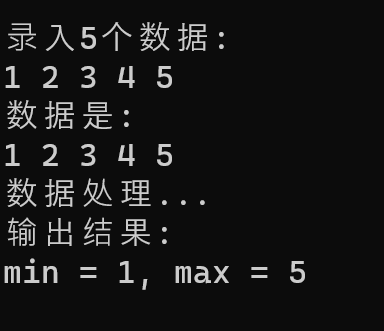
1.找到最大和最小值并把它付给max,min。
2.指向数组中第一个元素的地址。
task1_2 code

1 #include <stdio.h> 2 #define N 5 3 void input(int x[], int n); 4 void output(int x[], int n); 5 int* find_max(int x[], int n); 6 int main() { 7 int a[N]; 8 int* pmax; 9 printf("录入%d个数据:\n", N); 10 input(a, N); 11 printf("数据是: \n"); 12 output(a, N); 13 printf("数据处理...\n"); 14 pmax = find_max(a, N); 15 printf("输出结果:\n"); 16 printf("max = %d\n", *pmax); 17 return 0; 18 } 19 void input(int x[], int n) { 20 int i; 21 for (i = 0; i < n; ++i) 22 scanf("%d", &x[i]); 23 } 24 void output(int x[], int n) { 25 int i; 26 for (i = 0; i < n; ++i) 27 printf("%d ", x[i]); 28 printf("\n"); 29 } 30 int* find_max(int x[], int n) { 31 int max_index = 0; 32 int i; 33 for (i = 1; i < n; ++i) 34 if (x[i] > x[max_index]) 35 max_index = i; 36 return &x[max_index]; 37 }
task1_2 result
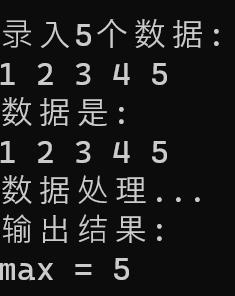
1. 找到最大值,并返回其地址。
2.可以。
task2_1 code

1 #include <stdio.h> 2 #include <string.h> 3 #define N 80 4 int main() { 5 char s1[] = "Learning makes me happy"; 6 char s2[] = "Learning makes me sleepy"; 7 char tmp[N]; 8 printf("sizeof(s1) vs. strlen(s1): \n"); 9 printf("sizeof(s1) = %d\n", sizeof(s1)); 10 printf("strlen(s1) = %d\n", strlen(s1)); 11 printf("\nbefore swap: \n"); 12 printf("s1: %s\n", s1); 13 printf("s2: %s\n", s2); 14 printf("\nswapping...\n"); 15 strcpy(tmp, s1); 16 strcpy(s1, s2); 17 strcpy(s2, tmp); 18 printf("\nafter swap: \n"); 19 printf("s1: %s\n", s1); 20 printf("s2: %s\n", s2); 21 return 0; 22 }
task2_1 result
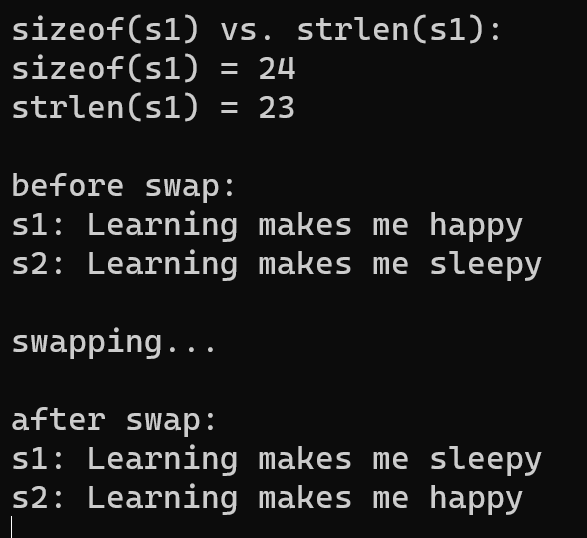
1.s1大小为24,sizeof计算的是其所占用内存,strlen统计字符数(除去空字符)。
2.不可以,s1是地址常量,不可以赋值。
task2_2 code

1 #include <stdio.h> 2 #include <string.h> 3 #define N 80 4 int main() { 5 char* s1 = "Learning makes me happy"; 6 char* s2 = "Learning makes me sleepy"; 7 char* tmp; 8 9 printf("sizeof(s1) vs. strlen(s1): \n"); 10 printf("sizeof(s1) = %d\n", sizeof(s1)); 11 printf("strlen(s1) = %d\n", strlen(s1)); 12 printf("\nbefore swap: \n"); 13 printf("s1: %s\n", s1); 14 printf("s2: %s\n", s2); 15 printf("\nswapping...\n"); 16 tmp = s1; 17 s1 = s2; 18 s2 = tmp; 19 printf("\nafter swap: \n"); 20 printf("s1: %s\n", s1); 21 printf("s2: %s\n", s2); 22 return 0; 23 }
task2_2 result
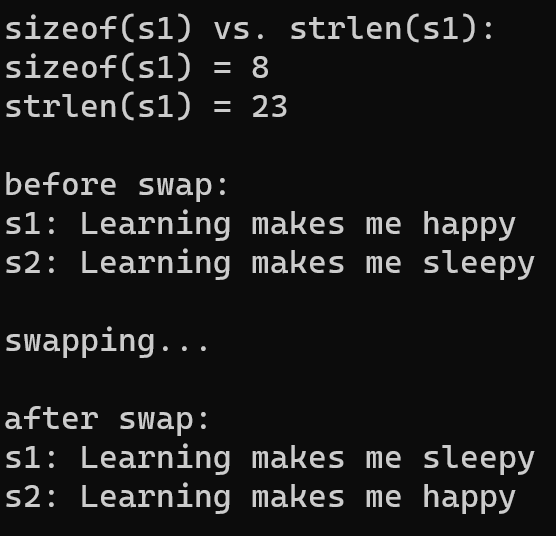
1.s1存放第一个字符串的起始地址。sizeof计算的是地址所占的内存大小。strlen统计的是字符数。
2.可以。把指针s1指向了这个字符串。
3.交换的是指针的指向。两个字符串在内存储存单元中没有交换。
task3 code

1 #include <stdio.h> 2 #include <stdio.h> 3 int main() { 4 int x[2][4] = { {1, 9, 8, 4}, {2, 0, 4, 9} }; 5 int i, j; 6 int* ptr1; // 指针变量,存放int类型数据的地址 7 int(*ptr2)[4]; // 指针变量,指向包含4个int元素的一维数组 8 printf("输出1: 使用数组名、下标直接访问二维数组元素\n"); 9 for (i = 0; i < 2; ++i) { 10 for (j = 0; j < 4; ++j) 11 printf("%d ", x[i][j]); 12 printf("\n"); 13 } 14 printf("\n输出2: 使用指向元素的指针变量p间接访问二维数组元素\n"); 15 for (ptr1 = &x[0][0], i = 0; ptr1 < &x[0][0] + 8; ++ptr1, ++i) { 16 printf("%d ", *ptr1); 17 if ((i + 1) % 4 == 0) 18 printf("\n"); 19 } 20 printf("\n输出3: 使用指向一维数组的指针变量q间接访问二维数组元素\n"); 21 for (ptr2 = x; ptr2 < x + 2; ++ptr2) { 22 for (j = 0; j < 4; ++j) 23 printf("%d ", *(*ptr2 + j)); 24 printf("\n"); 25 } 26 return 0; 27 }
task3 result
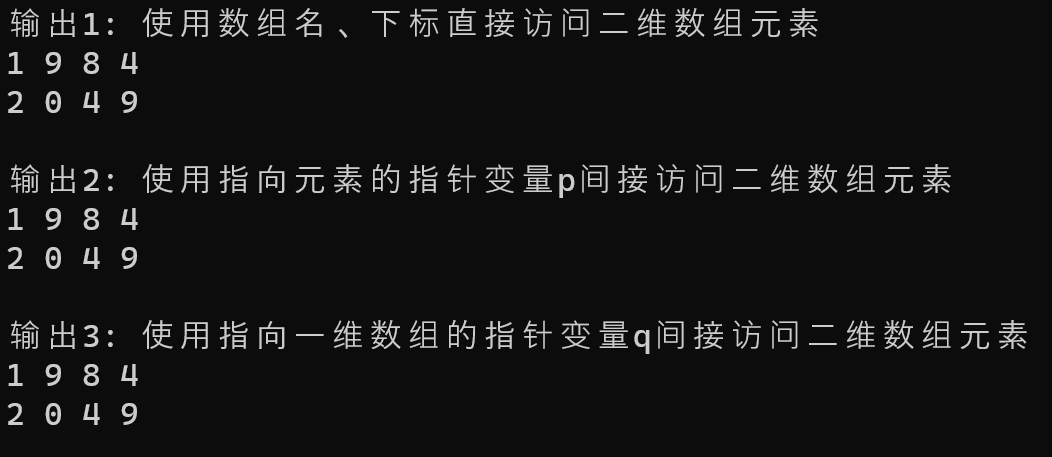
1.指针变量,指向包含4个int元素的一维数组。
2.数组名,一个可以存放四个指针变量的数组。
task4_1 code

1 #include <stdio.h> 2 #define N 80 3 void replace(char* str, char old_char, char new_char); // 函数声明 4 int main() { 5 char text[N] = "c programming is difficult or not, it is a question."; 6 printf("原始文本: \n"); 7 printf("%s\n", text); 8 replace(text, 'i', '*'); // 函数调用 注意字符形参写法,单引号不能少 9 printf("处理后文本: \n"); 10 printf("%s\n", text); 11 return 0; 12 } 13 // 函数定义 14 void replace(char* str, char old_char, char new_char) { 15 int i; 16 while (*str) { 17 if (*str == old_char) 18 *str = new_char; 19 str++; 20 } 21 }
task4_1 result

1.把旧的字符串中所有的i替换成*。
2.可以。
task4_2 code

1 #include <stdio.h> 2 #define N 80 3 void str_trunc(char* str, char x); 4 int main() { 5 char str[N]; 6 char ch; 7 printf("输入字符串: "); 8 gets(str); 9 printf("输入一个字符: "); 10 ch = getchar(); 11 printf("截断处理...\n"); 12 str_trunc(str, ch); 13 printf("截断处理后的字符串: %s\n", str); 14 } 15 void str_trunc(char* str, char x) { 16 while (*str) { 17 if (*str == x) 18 *str = NULL; 19 str++; 20 } 21 }
task4_2 result
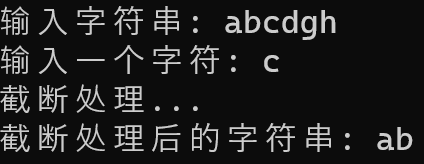
task5_1 code

1 #include <stdio.h> 2 #include <string.h> 3 void sort(char* name[], int n); 4 int main() { 5 char* course[4] = { "C Program", 6 "C++ Object Oriented Program", 7 "Operating System", 8 "Data Structure and Algorithms" }; 9 int i; 10 sort(course, 4); 11 for (i = 0; i < 4; i++) 12 printf("%s\n", course[i]); 13 return 0; 14 } 15 void sort(char* name[], int n) { 16 int i, j; 17 char* tmp; 18 for (i = 0; i < n - 1; ++i) 19 for (j = 0; j < n - 1 - i; ++j) 20 if (strcmp(name[j], name[j + 1]) > 0) { 21 tmp = name[j]; 22 name[j] = name[j + 1]; 23 name[j + 1] = tmp; 24 } 25 }
task5_1 result

task5_2 code

1 #include <stdio.h> 2 #include <string.h> 3 void sort(char* name[], int n); 4 int main() { 5 char* course[4] = { "C Program", 6 "C++ Object Oriented Program", 7 "Operating System", 8 "Data Structure and Algorithms" }; 9 int i; 10 sort(course, 4); 11 for (i = 0; i < 4; i++) 12 printf("%s\n", course[i]); 13 return 0; 14 } 15 void sort(char* name[], int n) { 16 int i, j, k; 17 char* tmp; 18 for (i = 0; i < n - 1; i++) { 19 k = i; 20 for (j = i + 1; j < n; j++) 21 if (strcmp(name[j], name[k]) < 0) 22 k = j; 23 if (k != i) { 24 tmp = name[i]; 25 name[i] = name[k]; 26 name[k] = tmp; 27 } 28 } 29 }
task5_2 result

交换的是指针变量的值。
task6 code

1 #include <stdio.h> 2 #include <string.h> 3 #define N 5 4 int check_id(char* str); // 函数声明 5 int main() 6 { 7 char* pid[N] = { "31010120000721656X", 8 "330106199609203301", 9 "53010220051126571", 10 "510104199211197977", 11 "53010220051126133Y" }; 12 int i; 13 for (i = 0; i < N; ++i) 14 if (check_id(pid[i])) // 函数调用 15 printf("%s\tTrue\n", pid[i]); 16 else 17 printf("%s\tFalse\n", pid[i]); 18 return 0; 19 } 20 int check_id(char* str) { 21 int flag = 1, cnt = 0; 22 23 while (*str) { 24 if (*str != 'X') { 25 if (*str >= '0' && *str <= '9'); 26 else 27 flag = 0; 28 } 29 str++; 30 cnt++; 31 } 32 if (cnt != 18) 33 flag = 0; 34 35 return flag; 36 }
task6 result
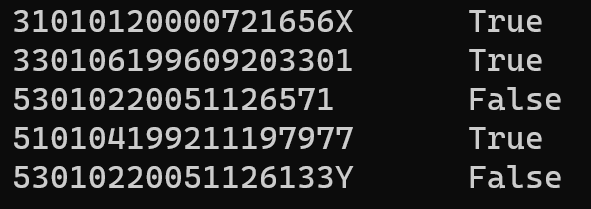
task7 code

1 #include <stdio.h> 2 #define N 80 3 void encoder(char* str); 4 void decoder(char* str); 5 6 int main() { 7 char words[N]; 8 9 printf("输入英文文本: "); 10 gets(words); 11 12 printf("编码后的英文文本: "); 13 encoder(words); // 函数调用 14 printf("%s\n", words); 15 16 printf("对编码后的英文文本解码: "); 17 decoder(words); // 函数调用 18 printf("%s\n", words); 19 return 0; 20 } 21 void encoder(char* str) { 22 while (*str) { 23 if (*str >= 'a' && *str <= 'y') 24 *str = *str + 1; 25 else if (*str >= 'A' && *str <= 'Y') 26 *str = *str + 1; 27 else if (*str == 'z') 28 *str = 'a'; 29 else if (*str == 'Z') 30 *str = 'A'; 31 str++; 32 } 33 } 34 void decoder(char* str) { 35 while (*str) { 36 if (*str > 'a' && *str <= 'z') 37 *str = *str - 1; 38 else if (*str > 'A' && *str <= 'Z') 39 *str = *str - 1; 40 else if (*str == 'a') 41 *str = 'z'; 42 else if (*str == 'A') 43 *str = 'Z'; 44 str++; 45 } 46 47 }
task7 result





 浙公网安备 33010602011771号
浙公网安备 33010602011771号